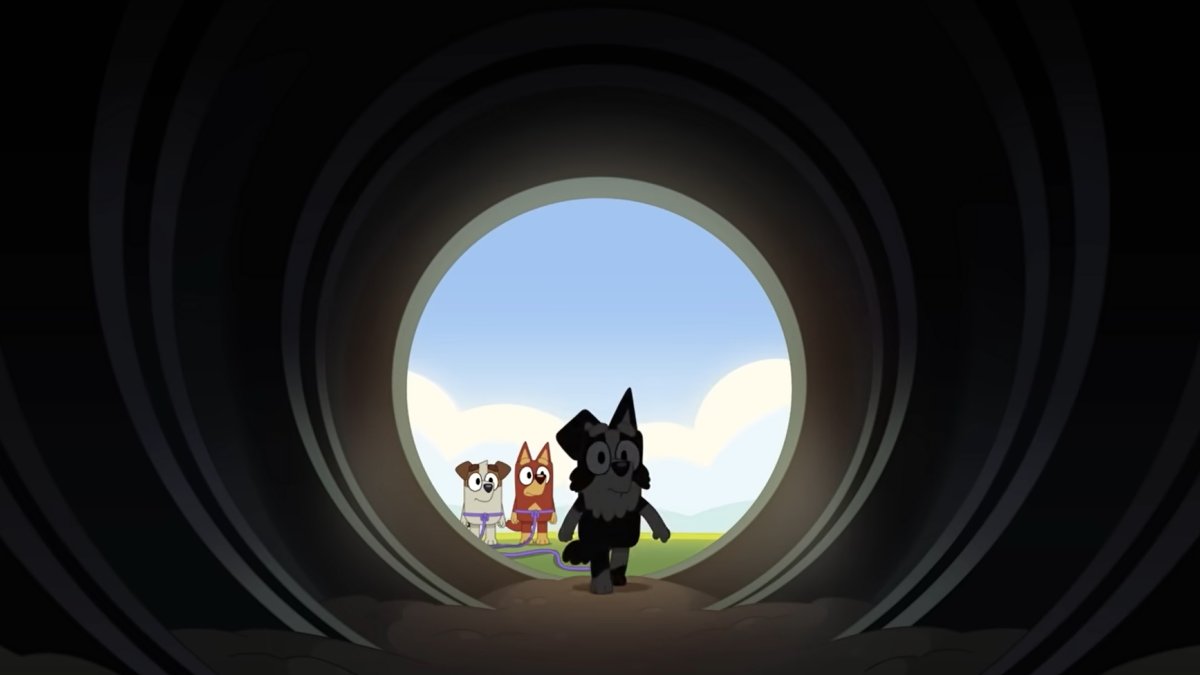This ‘Bluey’ Episode Is Its Best—and Most Underrated

Bluey is one of the greatest animated shows of all time. It deals with serious issues—life, death, parenthood—in a way small children can understand. And adults understandably love it, too. But some of those adults have confessed to being a little confused by the episode “Space.”
It’s not as straightforward as your average Bluey episode. I was confused by “Space” when I first saw it, too. Why was Mackenzie running away from his friends? What did Calypso mean when she appeared at the slide? Then I sat back and thought, wow … this episode is fantastic at explaining trauma in a way that kids can understand.
“Space” is an episode that barely features Bluey herself, which might explain why it’s so underrated. After all, Bluey is the star of the show, and kids want to see her adventures first and foremost. But sometimes the show takes a diversion and highlights another character, and “Space” is all about Bluey’s friend Mackenzie.
Mackenzie learns to process big emotions
Mackenzie spends “Space” playing astronauts with his friends Jack and Rusty. He’s given the role of chief scientist, the one who “tries to figure out everything,” but he keeps walking away from the game. Something is clearly on his mind, and he’s pushing his friends away as he tries to deal with it. Many adults can relate to that feeling of wanting to be alone while dealing with something.
“I want to pretend that you leave me behind and I’m all alone,” Mackenzie tells Jack and Rusty. There’s something he’s trying to process via play, much like Bluey processed her feelings about the death of a bird via play in “Copycat.” It’s something children often do, and it’s an important part of their development. But Mackenzie’s friends don’t want to leave him alone.
The kids get back into their “spaceship” (really an old boat) and Mackenzie decides to set it on a course for a “black hole,” something the three of them talked about earlier. When he reaches the “black hole”— actually just a small tunnel—he stays looking at it for a long time, like it reminds him of something. Mackenzie’s friends try to stop him from going into the tunnel, but Mackenzie feels like he absolutely has to go in. He has to relive something that the tunnel represents, no matter how afraid he is of the prospect.
It turns out Mackenzie once had an unpleasant encounter with his own version of a “black hole.” He went through a slide at the shopping mall and couldn’t find his mother on the other side. Actually, she was just on the other side of the slide watching him, but Mackenzie didn’t know that.
Mackenzie imagines going down the slide and not being able to find his mother. His teacher Calypso appears—whether she was there for the actual event is left up to the viewer—and points out his mother to him. Then she gently tells him, “You know what’s here now. You don’t need to keep coming back to this place.”
“Space” is about processing trauma
Calypso’s words may resonate with a lot of adults who have been through trauma. The urge to keep replaying it, to keep “coming back,” is only natural, but Mackenzie manages to get through this and overcome his trauma with the help of Calypso’s wise words. The fact that it’s a very small trauma is irrelevant—not only was it a big deal to someone as young as Mackenzie, but small traumas can and do cause big repercussions for people. People often keep revisiting them until they grow into something bigger and more uncontrollable.
Not only does Mackenzie learn that it’s okay to let go of what’s bothering him, but Jack and Rusty return for him so he doesn’t have to be alone. They even save him from some “aliens”! (One of whom is Bluey.) Mackenzie comes away from the encounter feeling better and safer, knowing that he has a support system and that he “knows what’s there” in his mind.
“Space” is a fantastic episode for teaching both kids and adults about processing trauma. Curiously, it doesn’t make a lot of Bluey top ten lists (I guess there are just so many good ones to choose from), but it should. It deserves all the accolades going for its gentle depiction of a mental health problem.
Have a tip we should know? [email protected]
